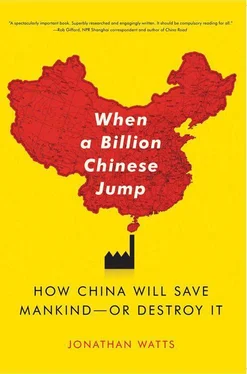A strange and half-incredible sight… It was superb and exquisite. An austere emotion carried the eye upwards from milk-blue roofs to the gray rock bastion above… Beyond that, in a dazzling pyramid, soared the snow slopes of Karakal… the loveliest mountain on earth. (p. 66)
This resonated with visions of an earthly paradise found in other religions. The elements are remarkably consistent: fertility, diversity, color, tranquillity, and sparse, peaceful populations. These tropes form a baseline of sorts for man’s ideal view of the world. In economic terms, paradise is a place where natural supply exceeds human demand, where there is plenty of everything.
Hilton’s interwar fantasy was conceived not in southwest China but in northeast London, in Woodford Green, a Sunday afternoon’s drive away from my home in Barnet. Hilton never revealed the source of his inspiration, but the closest the author ever got to the Himalayan or Kunlun ranges was Pakistan. His descriptions of the mountain Utopia were widely—though probably not accurately—believed to be based on scientific studies and National Geographic reports about Yunnan by the eccentric U.S. botanist-adventurer Joseph Rock. 3
The Shangri-La myth of a land that could reseed human civilization after the planet was destroyed by war struck a chord in the 1930s, when development seemed geared only toward industrial destruction. After the award-winning Hollywood director Frank Capra released a film version in 1937, it became the ultimate escapist fantasy for a world on the brink of military conflict. Franklin D. Roosevelt named his newly converted presidential retreat in Maryland Shangri-La. 4
Hilton’s utopian dream was later transformed into a marketing gimmick. In 1992, Asia’s biggest luxury hotel group was founded in Hong Kong with the Shangri-La name. Market research suggested that the majority of Western tourists to Tibet and Nepal came seeking a Shangri-La experience. 5China’s communist authorities started to take notice. Although the state had spent years dismissing Hilton’s fantasies as romantic nonsense, local governments suddenly began competing with one another to be recognized as Shangri-La. The fiercer the rivalry, the more distorted the utopian ideal became.
I headed to Lijiang, Joseph Rock’s base from 1922 to 1949. Like all of northwest Yunnan, the setting was idyllic. In the old town, traditional wood buildings sloped up the hillside, the Jade Dragon Snow Mountain towered in the distance, and the streets thronged with a colorful ethnic mix. The city was historically rich. Kublai Khan’s troops crossed the river here. The Red Army passed through on their Long March. For decades, the spectacular setting, Naxi-minority architecture, and canal-lined streets attracted artists, writers, and adventurers. After 1996, when it was recognized as a UNESCO World Heritage Site, it became a fixture on the banana-pancake trail of foreign backpackers. 6After the rebranding of northwest Yunnan as Shangri-La, this swelled into a wave of domestic travelers. 7
Lijiang was a center of Dongba shamanistic culture. Its followers believed the overuse of natural resources would invite the wrath of heaven because man and nature were half brothers. This worship of nature was thought to have its roots in the ancient Bon spiritual tradition that was once the dominant belief system in the Himalayas and gave Tibetan Buddhism its animistic character, notably the worship of mountains and lakes. But those values had been marginalized by an influx of outsiders.
Wandering through the cobbled alleys in the afternoon, I saw flag-waving tour guides steer coachloads of Han—the ethnic majority in China—from trinket shop to trinket shop. In the evening I strolled along the raucous bar street by the canal. The picture-postcard scene of willow trees, limpid waters, and rough-hewn stone was illuminated by hundreds of red lanterns, neon signs, and the flashes of tourist cameras. The traditional wooden structures were packed to the rafters. Tourists joined girls in colorful Naxi costume in singing contests between balconies on either side of the stream. Some of the women claimed to be from the nearby Mosuo matriarchal community, where a tradition of “one-night marriages” has become synonymous with free love. Locals said they were really prostitutes from other parts of China who counterfeited the Mosuo image to lure customers. It was intellectual piracy, brand-name theft.
Sexual freedom was one of many fantasies on sale in Lijiang. The myth of Shangri-La was another. I went in search of the man who has done more than anyone to shape discussion of the lost paradise. Xuan Ke was not hard to find. Almost every night, he leads one of the planet’s most remarkable orchestras. The Naxi Ancient Music Association plays to packed houses at every performance. With bright, flowing robes and wispy white beards, the orchestra members ambled slowly to their antique instruments like a council of wizards preparing to demonstrate their spells.
Xuan was their conductor. He was also a scholar, musician, raconteur, mission-school Christian, former political prisoner, and—according to his enemies—a self-promoting charlatan. He was a man with a story to tell. In 1957, during Mao Zedong’s anti-rightist campaign, Xuan was put in prison along with his father, who was to die in jail. It was only after Mao’s death that he was pardoned.
Since then, he has become a celebrity. The concert-hall audience lapped up his anecdotes about the hard times of the past. Between each piece, Xuan skillfully harangued Han Chinese and foreign tourists with criticism of contemporary politics sweetened by jokes about his orchestra’s age and infirmity.
“I am seventy-seven years old. I have spent twenty-one of those years in jail. But I shouldn’t talk about this for too long or our elder members might fall asleep at their instruments,” he said, first in Putonghua and then in remarkably good English, to chuckles from the crowd.
After the performance, we waited for half an hour as he signed autographs and posed for photographs with a long line of fans. Over dinner, he told us how he was responsible for the “Shangri-Lazation” of northwest Yunnan.
Xuan’s father was Rock’s guide. Xuan remembered from childhood the eccentric U.S. botanist who traveled through the remotest areas with a full set of cutlery and a plastic bathtub. “Rock was a very hot-tempered man. He was short, with a loud voice and always shouting. I could hear his sopranolike voice at great distance. He used to quarrel about everything,” Xuan recalled.
In 1995, when Xuan first made the link between Rock, Hilton, Shangri-La, and his mother’s home in the neighboring county of Deqin, he was condemned by local officials, who said the idea of an otherworldly Oriental Utopia was a colonial concept. But when the Shangri-La myth started to draw in tourists and money, they quickly changed their tune.
Any community where Joseph Rock might conceivably have plonked his portable bathtub tried to cash in on the fantasy. In Yunnan, rival claims to be the inspiration for Shangri-La were made by Zhongdian and Lijiang. In Sichuan, the candidates were Daocheng, Jiuzhaigou, Xiangcheng, and Derong. In Gansu, it was Xiahe. A community in Pakistan’s Hunza Valley claimed to have directly inspired Hilton on his visit there a few years before he wrote Lost Horizon. Others in Tibet, Bhutan, and Nepal claimed to be closer to the far older Buddhist concept of “Shambala,” the Sanskrit word for spiritual Utopia, that some believe inspired the name of Hilton’s hidden paradise.
In an ideal world, the competition could have been a test of which community was living in closest harmony with the environment. Reality was rather different. The contest in China was political, driven by greed and characterized by bribery, dubious academic research, and an overriding desire to attract millions of big-spending, high-consuming, paradise-seeking tourists. Zhongdian, the main town in Diqing prefecture, hosted a conference of journalists from all over the country. The reporters were lavishly wined and dined and, according to Xuan, each given two local beauties as company. 8
Читать дальше










